Text
A hospital tried to kill my sister for her organs.
She got spinal meningitis at six months old, and the doctors lied to my mother by insisting she was already braindead, and they tried to convince my mother to sign away her parts. Mom refused, insisting they do everything they could to save my sister. They even tried removing her breathing tube without telling Mom, but my sister started breathing all on her own.
Because they spent so long without actually treating her, the swelling in her brain caused permanent brain damage. My sister was left permanently handicapped, and she died only a few years later at the age of five.
Is it time to trot out my organ doner conspiracy theory or are y'all not ready for it?
920 notes
·
View notes
Text
The Secret World of Arrietty
Inspired by the fact that I am rewatching my first ghibli movie spirited away
Please reblog for bigger sample size
11K notes
·
View notes
Text
Alright, I’m off work now, let’s do this. You better buckle up, Buttercup, this is gonna be a long one.
You are technically correct, OP, the couples you listed don’t outright say “I love you” “I love you too”, HOWEVER, what they actually say is just as good if not better.
Rapunzel and Eugene:
Rapunzel has been hearing “I love you” from the person who’s been abusing and gaslighting her for eighteen years. Even worse, the exchange turned love into a competition that Rapunzel always lost -> Gothel: I love you very much, dear. Rapunzel: I love you more. Gothel: I love you most.
Gothel has lied to Rapunzel for eighteen years, insisting that her abuse is done out of love for Rapunzel, but that love is based on what Rapunzel has to offer Gothel: her magic hair. Every display of affection Gothel ever shows Rapunzel ties back to her hair, calling her “my flower”, patting her on the head, kissing her hair, their even their bonding ritual of brushing Rapunzel’s hair while she sings the incantation.
Eugene initially has a nickname for Rapunzel too, calling her “Blondie” on two separate occasions; once when he calls up to her when they first set out, and once when he rebuffs her attempt to get to know him in the Snuggly Duckling’s tunnel. However, he soon drops the nickname, calling her by her actual name once he gives her his by the campfire. Much like how his displays of affection involve getting her hair out of the way so he can see her face, his use of her name shows that his love is not transactional. Eugene isn’t interested in what he can get out of Rapunzel, he’s interested in Rapunzel herself.
If Eugene had said “I love you”, it would have felt hollow, and it wouldn’t have shown his love to be any truer than Gothel’s was. So he doesn’t say it. Instead, after fully freeing her from Gothel’s control by cutting her hair, he says “You were my new dream.” Their whole journey began because Rapunzel had a dream, and she enlisted Eugene for help in making it come true. Over the course of their adventure, we learn of Eugene’s dream of living alone with vast riches…and we see that dream change. During I See the Light, Eugene has the lyric “if she’s here, it’s crystal clear I’m where I’m meant to go”, which shows how his priorities have begun to shift. Being rich and alone isn’t what he wants anymore, what he wants now is to be with Rapunzel. He communicates this to Rapunzel when he says “you were my new dream”, because just before the floating lanterns they’d talked about dreams, and he’d said that making a dream come true meant you got to find a new dream, to find a new thing to hope and wish for. She reciprocates his feelings, and immediately communicates it by replying “And you were mine.”
Even better, once he’s healed, Eugene further affirms his love when he says “Did I ever tell you I’ve got a thing for brunettes?” It sounds like a joke at first, but this attempt at wit further cements that Eugene loves Rapunzel, not her power. The blonde hair was a symbol of her magic, and the change in color clearly communicates its loss. Eugene saying he likes Rapunzel just as much without the blonde hair is him saying he likes her without the magic that was all Gothel truly cared about.
Cinderella and the Prince:
It’s something of a tradition in musicals for two characters to fall in love during a musical number, and Cinderella and her prince are no exception. We don’t get very much dialogue between the two of them, but we do get to hear their thoughts on the matter thanks to the song So This Is Love.
A musical number functions in much the same way as a montage, it compresses time into an easily viewed and understood scene as we move between major set pieces in a story. From the moment they meet, Cinderella and the Prince are lost in their own little world together, completely oblivious to the world and people around them; we see this when the pair full on leave the massive party to wander through the gardens together. While they’re together, the song gives us a peek into their thoughts, with both contemplating the feelings being with the other brings out in them: “So this is love, so this is love. So this is what makes life divine. I’m all aglow, and now I know the key to all Heaven is mine. My heart has wings, and I can fly. I’ll touch every star in the sky.”
We get very little of them, since the movie chooses to focus more on the mice and the Grand Duke, but the desperation in the Prince’s voice when he asks a fleeing Cinderella “How will I find you?” rather says it all. They haven’t known each other long, and neither of them even thought to ask for a name, but they desperately want to see each other again.
Aurora and Prince Phillip:
Their meeting in the woods is like something out of a dream, so much so that when Phillip first hears Aurora singing, he believes her to be a wood sprite. They’d first met as children, and didn’t know at the time that they’d already been betrothed. Aurora was so young, she didn’t even remember the meeting, and yet when she meets Phillip in the forest, it’s as if they’ve known each other for years. “I know you, I walked with you once upon a dream. I know you, that gleam in your eyes is so familiar a gleam. And I know it’s true that visions are seldom all they seem; but if I know you, I know what you’ll do: you’ll love me at once, the way you did once upon a dream.”
Much like Rapunzel, Aurora has been sheltered from the world her whole life. Unlike Rapunzel, however, there actually was a malevolent force out to get her. Maleficent had been sending her minions out to search for Aurora for years, growing more and more vicious as they failed to find her. Because of this very real danger, the fairies had smothered Aurora, always reminding her to not talk to strangers; they proved so successful at this that Aurora’s only companions are the animals she encounters in the forest. When she gazes longingly at her parents’ castle (not that she knows that) she’s longing for human connection, for people she can spend time with and relate to.
Phillip is also longing for close connection (did you ever notice his only friend seems to be his horse?). His father tells him he has to marry a princess, but Phillip isn’t interested in marrying some princess he’s never so much as talked to. Instead, he’s drawn to a peasant girl he’s just met, but is clearly as desperate for someone to talk to as he is. He goes to the cottage in the woods to see his beloved peasant girl, only to be taken captive by Maleficent herself, who -after imprisoning him in her dungeon- reveals that the peasant girl he’s fallen in love with is the princess he’s been betrothed to since childhood. He battles past deadly traps, a wall of thorns, and a fire-breathing dragon to rescue the peasant girl he’s in love with, still having never seen her as the princess she turned out to be. It’s the princess he’s going to marry that he finds at the top of the tower, but the two come together when she wakes. He kisses the princess he’s in love with, and the peasant girl he’s going to marry smiles at him. They’ve been dreaming the same dream, and now they get to wake up to find the reality even better than the dream.
Snow White and The Prince:
“Guy kisses a 12 year old’s corpse, gets married and never says a word” not to be rude, but did you skip the first half of the movie? Their first scene together is the very first scene of the movie. They have a whole duet together!
The prince finds Snow White singing into the wishing well and joins in, finishing the lyric she’d set. Snow: I’m wishing for the one I love to find me— Prince: Today! Once he’s made his presence known, he continues to sing, offering up his own lyrics now that he’s heard hers.
“I have but one song, one song only for you. One heart, tenderly beating, ever entreating, constant and true. One love that has possessed me, one love thrilling me through. One song, my heart keeps singing, of one love, only for you.” The Prince declares he has love only for Snow White, and that his heart beats only for her. She reciprocates his affection, and the pair even send each other kisses via dove as she departs.
After Snow White is taken into the woods by the Huntsman, the prince searches for her, never giving up the search even as seasons pass. When he finds her in her glass coffin, he’s devastated to learn he’s found her too late. His kiss isn’t because he’s got a necrophilia fetish, it’s a heartbroken farewell to a lost loved one. He kisses her to tell her and the world that even death could not keep him from fulfilling his promise to love her.
Here’s a whole post analyzing these two and their love scene, which I highly recommend reading.
Belle and Beast:
If the Beast’s arc is about anything, it’s about getting to the heart of something instead of taking things at face value. As the pair grow closer, Beast takes the initiative to SHOW Belle how he feels about her, to make it clear through his actions what she means to him. Gifting her the library, having their own private ball, and letting her go to save her father are all him demonstrating his love. As the saying goes, “If you love something, let it go. If it was meant to be, it will come back to you.” Beast lets Belle go because whatever their feelings, her presence in the castle had not been without duress, as she’d taken her father’s place. He lets her go because he wants her to be happy, even if that means letting his curse become permanent.
But Belle returns, and she returns because she cares. Now Belle is at the castle because she wants to be, because she wants to save him. She returns for the Beast, and he is overjoyed to see her again, even amidst Gaston’s assault. Beast: You came back. Belle: Of course I came back.
Theirs is a love of actions rather than words, as we see time and again during the song Something There. The Beast continuously makes the effort to improve his own behavior for Belle’s sake (like remembering actual table manners and participating in her hobbies and pastimes), and Belle notices that effort and appreciates that he’s trying, and accommodates when she can.
Ariel and Eric:
The whole point with Eric and Ariel is that they are able to come together without words. This is why it’s Ariel’s voice that’s taken as opposed to something like her sense of smell, and why she doesn’t just write down what she wants to say.
Every time they try to say how they feel, something gets in the way, trying to keep them apart. Eric was going to kiss Ariel by the end of Kiss the Girl, but Ursula’s machinations prevented it. He’d even been leaning in for it early on in the song, but he’s held back by thoughts of his mystery rescuer. He’s still thinking about that mystery girl later on, when Grimsby finds him staring towards the ocean, playing the melody Ariel had been singing on the beach. Grimsby encourages Eric to focus on a love that he knows is real, rather than continuing to pine over a dream girl who might not even exist, and ERIC LISTENS. Him tossing his flute into the sea is him choosing the mute girl he found on the beach over the mystery rescuer who could very well have been a figment of his imagination. He’s going to Ariel when Ursula turns up and brainwashes him.
By the film’s climax, the force of the seas themselves is trying to keep them apart, but Eric and Ariel aren’t going to let that happen. Ariel knowingly goes up against a sea witch to save the man she loves, desperate to save him from Ursula’s machinations. And when Ariel is taken, Eric is just as ready to face danger for her “Grim, I lost her once! I’m not gonna lose her again!” Even with the very real threat of Ursula bearing down on them, their first thought is for the other’s safety -> Ariel: Eric, you gotta get away from here! Eric: No, I won’t leave you!
By the end of the story, they don’t need words at all. Ariel comes back to him with her arms open wide, and Eric runs to meet her with a smile on his face.
Tiana and Naveen:
When convincing Charlotte to kiss him, Naveen extracts a promise from her to honor his original deal with Tiana, saying “She is my Evangeline.” Naveen had no way of knowing that Tiana was listening, but Charlotte doesn’t have the necessary context to understand what he means by that. Tiana does. When Tiana protests, Naveen says “It’s the only way to get you your dream!”
Naveen’s big flaw has always been his selfishness, his interest being so focused on himself that he unknowingly (and uncaringly) caused Lawrence -the only person he’d had left after being cut off by his parents- suffering. And he was totally fine with continuing that trend, planning to marry Charlotte for her money and nothing else. But things are different; now, Charlotte isn’t his meal ticket, to be mooched off of for his own sake. Now, marrying her is the burden he’s willing to take on if it means his love will be happy. Superficial pleasure has given way to genuine love, and that makes him happy when all the money in the world couldn’t. Even Tiana has given up on the superficial, her disgust of frogs forgotten when that frog is who she loves -> Tiana: I love you, Naveen. Naveen: Warts and all? Tiana: Warts and all.
That’s why they run out of time, and Charlotte’s kiss doesn’t work. Naveen would love Tiana even if she was a worm, because he married her when she was a frog. Tiana: We’re staying frogs, Ray. Naveen: And we’re staying together. They find financial success in the end, once they’re married and human again, but it was love that made them truly happy.
Hercules and Meg:
Meg famously has a whole song where she insists she won’t say she’s in love. Spoiler alert: she does. Meg has been burned before, having put herself on the line for a guy, only to have it thrown back in her face when he ran off with someone else. She’d promised herself she wouldn’t be hurt like that again, but as she says when Hercules asks why she saved him “People do crazy things when they’re in love.”
In Hercules, she not only finds someone who she’s willing to risk getting hurt for again, she finds someone who returns the favor. She saves Hercules from the falling pillar, taking the pain meant for him. And where before she was left behind, bound by her own sacrifice, now she’s found someone who returns that devotion. When she succumbs to her injuries, Hercules risks being trapped in the Underworld to get her back, just as determined to save her as she’d been to save him.
For his part, Hercules has always been ostracized for his strength, first as a freak, and then as a hero on a pedestal. Meg was one of the few who treated him as an equal, neither afraid of him nor holding him to an impossible standard. In her, he finds someone he can be vulnerable with, because that vulnerability won’t shatter the worshipful ideal he’s held to by the rest of the mortals “Meg, when I’m with you…I don’t feel so alone.”
Hercules braves the Underworld for the one person he could truly be himself with. And when he succeeds, emerging from the Underworld with Meg’s soul lovingly cradled in his arms, he echoes Meg’s own words when she asks him why he’d done it “People always do crazy things when they’re in love.”
Do they outright say “I love you” “I love you too”? No. But what they do say is far more personal, and does far more to declare their love.
SPOILERS FOR "ELEMENTAL"

Okay so I just watched the new elemental movie and it made me realize something very interesting
Now, I'm not going to get into the plot or the side stories or the fact that movie is just OBSESSED with everyone's dad
What I'm here to talk about it the fact that this movie actually has the 2 main characters utter the words "I love you" to eachother and that got me thinking
I have NEVER once heard the love interests in a disney movie say those words. Like- NOT ONCE- Seriously!
Rapunzel and Flynn: Never said it just got married
Cinderella and the Prince: Never said it, just got married
Jasmine and Aladdin: Never said it, just got married (I have since been corrected!)
Sleeping beauty: Girly is literally in a coma for most of the movie
Snow white and Prince: Guy kisses a 12 year old's corpse, gets married to her and never says a word
And then there are the cases where one of them says it but they never once say it to eachother
Beauty and the beast: Belle says it while her man is literally dying, like–??? He says he loves her in a different scene but they don't say it to eachother
Ariel and Eric: She says she loves him to her father but Eric he never says it
Tiana and Naveen: She says she loves him he never says it back (he says he loves her in a different scene when she isn't there)
Hercules and Meg: Meg had a whole ass song about it but they never said it to eachother
And there's a bajillion other examples
This was just like a total culture shock to me. It's actually incredible that almost all the disney movies, which center around love and couples, never have the two characters who are MEANT TO BE TOGETHER say even a single "love ya shawty" "Aww radical, love ya too bb"
#disney#disney movies#fairy tales#beauty and the beast#tangled#the princess and the frog#hercules#snow white and the seven dwarfs#cinderella#the little mermaid#sleeping beauty#long post#like really long post#long post is long
774 notes
·
View notes
Text
I’m gonna disagree with you about this, and I’ll type up a whole thing about it later, but right now I’m short on time.
SPOILERS FOR "ELEMENTAL"

Okay so I just watched the new elemental movie and it made me realize something very interesting
Now, I'm not going to get into the plot or the side stories or the fact that movie is just OBSESSED with everyone's dad
What I'm here to talk about it the fact that this movie actually has the 2 main characters utter the words "I love you" to eachother and that got me thinking
I have NEVER once heard the love interests in a disney movie say those words. Like- NOT ONCE- Seriously!
Rapunzel and Flynn: Never said it just got married
Cinderella and the Prince: Never said it, just got married
Jasmine and Aladdin: Never said it, just got married (I have since been corrected!)
Sleeping beauty: Girly is literally in a coma for most of the movie
Snow white and Prince: Guy kisses a 12 year old's corpse, gets married to her and never says a word
And then there are the cases where one of them says it but they never once say it to eachother
Beauty and the beast: Belle says it while her man is literally dying, like–??? He says he loves her in a different scene but they don't say it to eachother
Ariel and Eric: She says she loves him to her father but Eric he never says it
Tiana and Naveen: She says she loves him he never says it back (he says he loves her in a different scene when she isn't there)
Hercules and Meg: Meg had a whole ass song about it but they never said it to eachother
And there's a bajillion other examples
This was just like a total culture shock to me. It's actually incredible that almost all the disney movies, which center around love and couples, never have the two characters who are MEANT TO BE TOGETHER say even a single "love ya shawty" "Aww radical, love ya too bb"
774 notes
·
View notes
Text
Rewatching this movie again, and I love this analysis.
You know what’s great about Dr. Facilier?
He’s the perfect villain opposite both Tiana and Naveen.
He’s not exactly like Jafar or Ursula, who know they’re evil and delight in it as like, a lifestyle. He’s more like Scar. He’s introduced getting money on the street through cons and feeling satisfied…until Big Daddy LeBouf drives by with all his money and makes him feel insignificant.
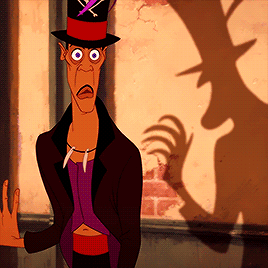
You get the idea that something in life made him this way—there was a beginning to his villainy. You don’t get that sense from like, Clayton or Gaston.
So he’s a relatable character with flaws, to an extent.
But those flaws specifically play off of Tiana and Naveen’s characterizations.
Tiana has no real respect from her peers—she is in a position to be jealous of Lottie the same way Facilier is jealous of the Cotton King. But where Tiana simply works hard and refuses to let others make her bitter, Facilier has clearly taken shortcuts. Or…”the easy way.”

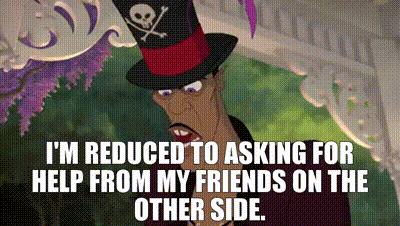
Then there’s Naveen.
Naveen has no thought beyond the present; he thinks they’re “on this earth to have some fun,” and frequently jumps without looking at the consequences. Leaps without looking! Doesn’t stop to find out if the girl he’s kissing is a real princess even though he knew his original invitation was to a costume party, forgets that he’s supposed to be getting married and plans on continuing his playboy lifestyle, wanders into a shadow-man’s shop. But eventually he learns to open his eyes to what’s important, and what will last, in Tiana. And he takes that seriously; if he marries her instead of Charlotte, he has to get three jobs.
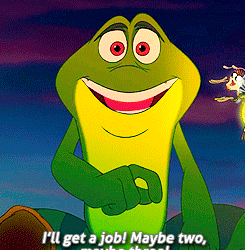
Facilier, on the other hand? He not only does the opposite of Tiana and has taken shortcuts to get where he is—but he also suffers from Naveen’s flaw; he keeps making what are basically get-rich-quick schemes with his “friends on the other side.” When we meet him, he’s stressed and certainly on edge about failing—but that doesn’t stop him from asking for more and more debt from the demons, and he basically goes to his grave still making promises he can’t keep…like Naveen’s promise he couldn’t keep to pay Tiana for kissing him.
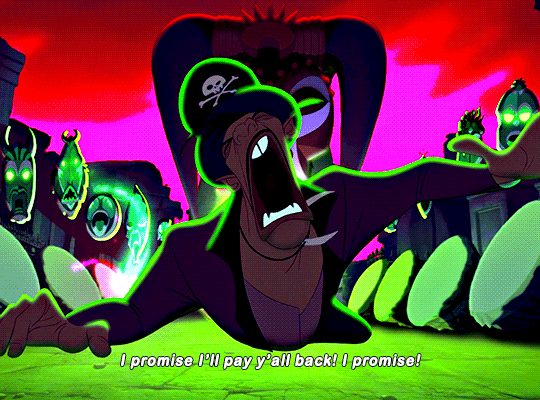
He’s got Tiana’s focus and Naveen’s charisma. He’s got Tiana’s lofty goals and Naveen’s dependence on others to do his dirty work.
He’s exactly like Tiana and Naveen put together, aged about twenty years, but with none of their good qualities. Perfect villain for those two main characters.
But he’s also the opposite of Mama Odie.
He entices innocents with what they want while she lights their way by explaining what they need.
He wants total control, while she’s satisfied with simply giving advice and sending people on their way.
He directly transforms his victims, while Mama Odie shows Tiana and Naveen how to work toward their transformation on their own. I mean, you guys noticed that she could have done it for them, right?

But she doesn’t, because she’s the symbol of that Disney Faith-Based morals: you act on what you know is true instead of taking the easy way to what you want. Facilier does the opposite: he promises to give you the easy way to what you want, and tries to tell you why you should accept his deals—but his reasons are all lies.
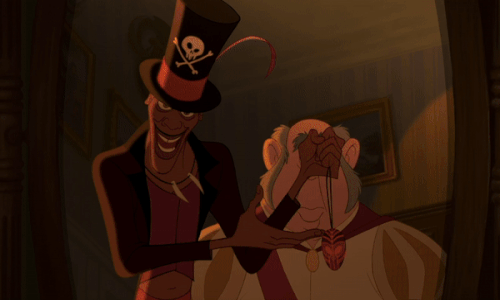
That’s how you write a villain, ladies and gentlemen.
552 notes
·
View notes
Photo
If you’re interested in a historically accurate redesign of Tiana, @artist-ellen has some beautiful art you should check out.

I tried to answer this succinctly, but it turned into an essay. (Sorry.)
The Princess and the Frog was not accurate, strictly speaking, but dinging it for that would be like criticizing the Lion King for not being a realistic wildlife documentary. Accuracy wasn’t really the point. Given the fantastical elements and fictional nations like “Maldonia”, I suppose we’re meant to understand this as a bit removed from the real New Orleans. It’s more a a jazz-flavored fairy tale than a historical fiction.
But for discussion’s sake….
Is it fashion-accurate to its 1926 timeframe? Ehhh, sort of. It pays homage to 20s fashion trends with cloche hats, furs and feathery headpieces, but without fully committing to it. The waistline on almost all of Tiana’s clothing is too high for the 20s, and the the shapes of her fancier costumes take a lot of liberties, or deviate wildly from the style of the period.
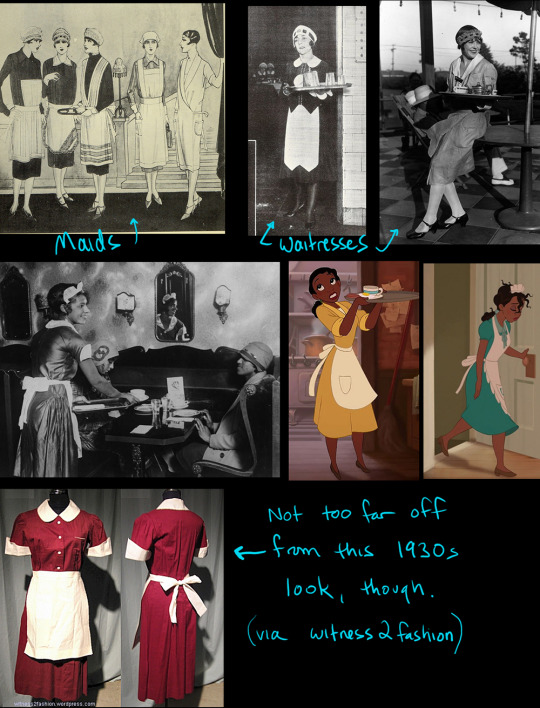
In the 20s, dresses (including workaday stuff) tended to have a straight up-and-down shape to it - kind of a low-waisted rectangle that de-emphasized curves instead of highlighting them. There are valid reasons to play fast and loose with that, though (something I’m definitely guilty of as well). One of those reasons is communication.
For instance, speculatively, the filmmakers wrote Tiana as a hard-working waitress and wanted her to look the part, so they made the choice to clothe her in something familiar - that gingham dress of mid-century shape that we broadly associate with diner waitresses. Actual waitress uniforms of the 20s had a fair bit of overlap with maid uniforms at the time too, and I can see why they wouldn’t want to risk the confusion. It’s more important to communicate clearly with the larger audience than to appease a small faction of fashion nerds who’d notice or care about the precision.
I don’t think it’s a case of the designers failing to do their research - I’m sure they had piles of references, and maybe even consultants - but they also had to have priorities.
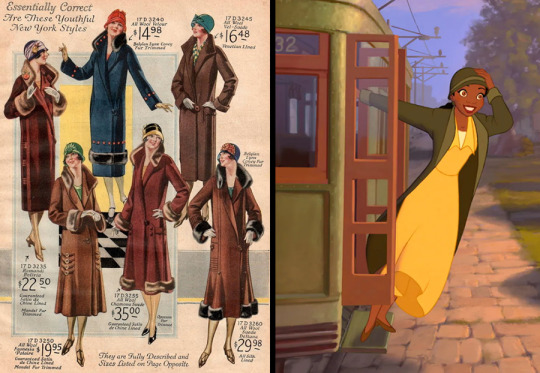
With her hat and coat on, she looks a lot more 1920s-shaped.
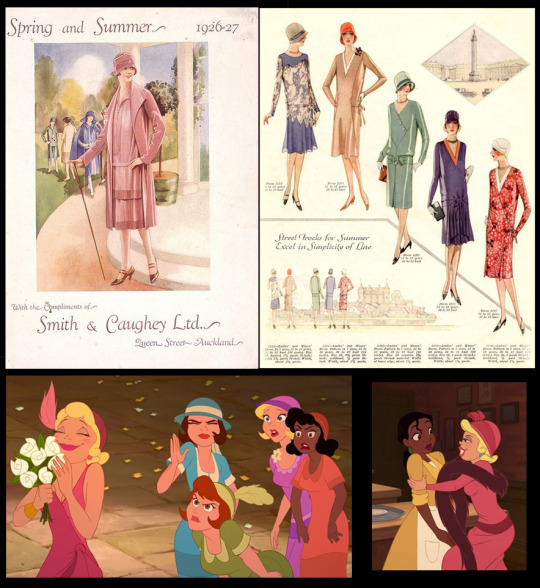
Pretty consistently, the indication of the characteristic 1920s drop waist is there, but the approach otherwise ignores the 20s silhouette. The clothes hug the body too much. This may be about appealing to a 2000s audience, visually speaking, but also could be an animation thing. Maybe both. For practical reasons, clothes in 2d animation are usually more a sort of second skin than something that wears or behaves like realistic fabric.
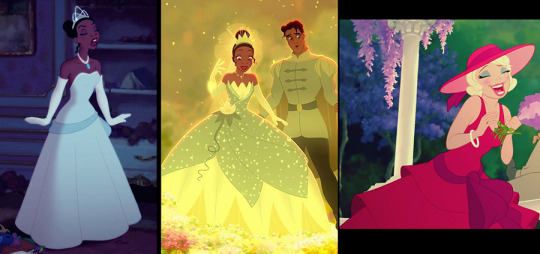
These are not in the 1920s ballpark at all. Tiana’s blue gown looks like your basic Disney brand invention. Strapless things would have been extremely unusual and the overall shape is far out of step. Excusable, I guess, because it’s a costume in context. Charlotte looks like she’s heading for a mimosa brunch in a modern maxi dress.
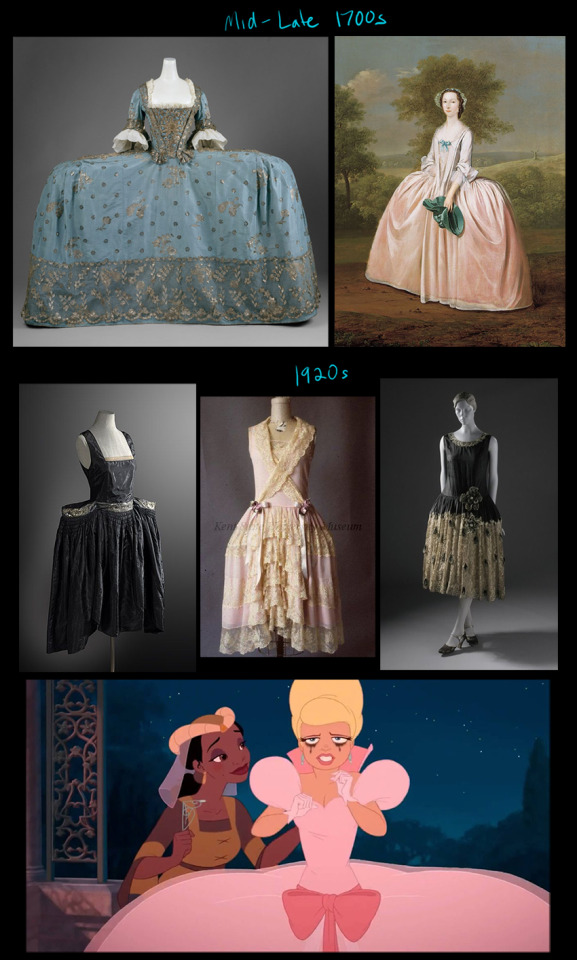
Charlotte’s princess dress did seem to be calling back to the ultra-wide pannier side hoops of the 18th century - something that made a reappearance for part of the 20s, albeit in much milder form called robe de style. I’m not sure if the filmmakers were alluding to that at all, really, but either way, her dress is hilarious.
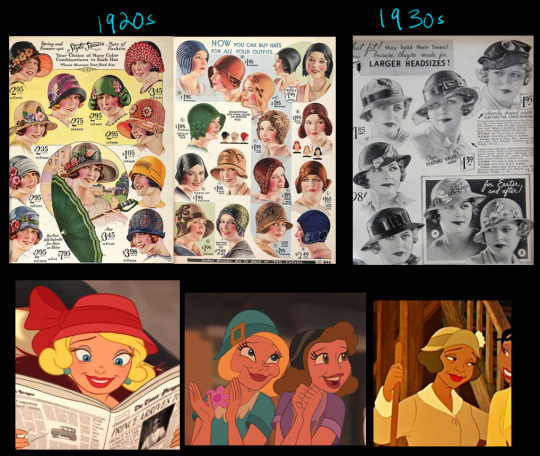
They only went about halfway with the cloche hats. The 1920s cloche really encapsulated the cranium, almost entirely covered bobbed hair, and obscured much of the face from certain angles, so it’s easy to see why they’ve been somewhat reined in for the film. Still, it ends up looking more 1930s, where the hats started to recede away from the face, evolving in the direction of the pillbox.
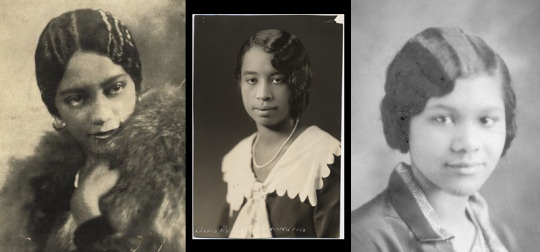
Similarly, Tiana’s hair is not very reminiscent of the bobbed, close-to-the-cranium style of the period, but I think that could legitimately be written off as characterization. She’s not at all the type of person who’d fuss about going à la mode. Not everyone bobbed and finger-waved their hair.
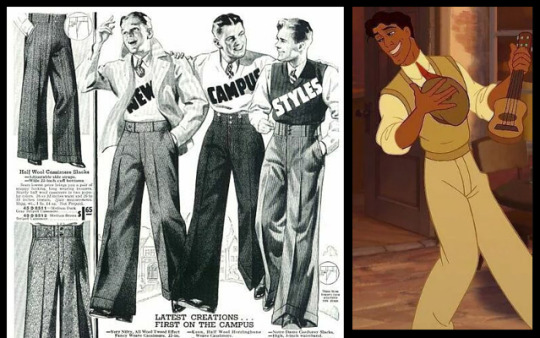
The clothes Prince Naveen is introduced in are very 1920s collegiate in spirit - the wide-leg oxford bags, the sleeveless pullover sweater, the flat cap, and high, stiff collar. The ukulele and banjolele were pretty trendy instruments at the time too.
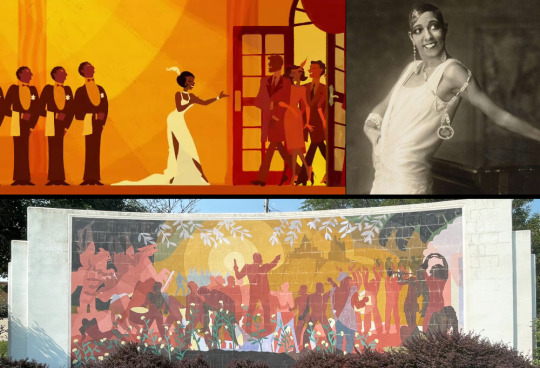
Definitely some Josephine Baker vibes here. Also, the look of this whole fantasy sequence was reportedly inspired by the works of Aaron Douglas, a luminary painter of the Harlem Renaissance known for his depictions of the lives of African-Americans. (The mural is in Topeka, Kansas.)
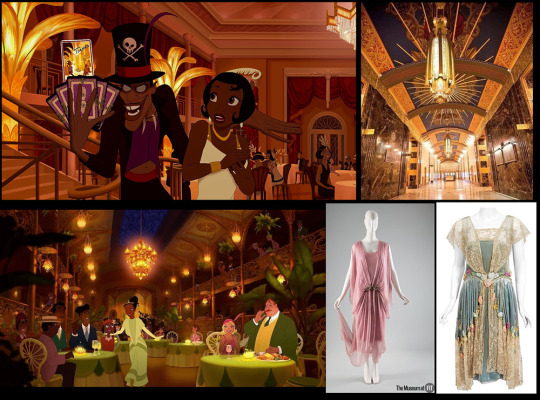
They pretty much nailed the Art Deco. It’s gorgeous. Looks somewhat inspired by the interiors of some of the Ralph Walker-designed NYC architecture, plus some French Quarter balcony flair for the final manifestation of Tiana’s Place. Her dress here does resemble some gauzy mid-1920s looks, too.
————————————————
Culturally speaking…
New Orleans is an unusual place. Because some of the colonial Spanish and French laws and conventions that New Orleans evolved under persisted even after its inception into the United States; because it was such a heterogeneous hub of indigenous and immigrant peoples; and because it had a considerable population of free people of color (mostly Creole), it did not function quite like the rest of the South leading up to the Civil War, nor for a while after. Its particular coalescence of cultures made it its own unique sort of culture within the country, within the region, within the state of Louisiana even. By the early 20th century, though, regardless of the not-very-binary nature of New Orleans, Jim Crow laws were enforcing a literal black-and-white distinction, and not an evenhanded one, by far. In that aspect, the city had begun to resemble the rest of the South.
The film nods at the wealth disparity, but goes on to paint a pretty rosy picture of race and class relations at the time. Still it’s not unbelievable that some people were exceptions to the rules. You could probably find a few compartments of old New Orleans society that resisted segregation or certain prejudicial norms, preferring to do things their own way. That aside, the film wasn’t trying to confront these topics. Not every piece of media should have to. Sometimes breaking away from miserable period piece stereotypes is refreshing. I’m not sure it could have handled that meaningfully given the running time, narrow story focus, and intended audience, anyhow. (But you could perhaps also make a case that family films habitually underestimate younger audiences in this way.)
————————————————
Raymond the firefly I guess is the film’s Cajun representation. There’s not much to say about it, except perhaps to note that Evangeline is a reference to the heroine of a Longfellow poem of the same name. The poem is an epic romance set during the expulsion of the Acadians from the eastern provinces of Canada and the northernmost reaches of the American colonies (now Maine) by the British in the mid-1700s. Many exiled Acadians gradually migrated south to francophone-friendly Louisiana, settling into the prairies and bayous, where ‘Acadian’ truncated into the pronunciation 'Cajun’. Evangeline - who is only finally reunited with her love when he’s on his deathbed - has become an emblem of the heartbreak, separation and faithful hope of that cultural history, and there are parishes, statues and other landmarks named after the her throughout Louisiana.
————————————————
Voodoo does have a very historical presence in New Orleans, having arrived both directly from West Africa and by way of the Haitian diaspora (where it would more properly be called Vodou). While I don’t think Disney’s treatment of it was especially sensitive or serious, it also wasn’t the grotesquely off-base sort of thing that media of the past has been known to do. It was largely whittled down to a magical plot component, but it wasn’t so fully repurposed that it didn’t resemble Voodoo at all either - and that’s mostly owing to the characters, because it does appear the writers pulled from history there.
It’s apparently widely held that Dr. Facilier is a Baron Samedi caricature - and likely that’s true, in part - but I have the impression he’s also influenced by Doctor John. Not the 20th century funk musician, but the antebellum “Voodoo King” of New Orleans. Doctor John (also called Bayou John, Jean La Ficelle, and other aliases) claimed to be a Senegalese prince. He became well known as a potion man and romance-focused prognosticator to people from all corners of society. Though highly celebrated and financially successful at his peak, he seems ultimately remembered as an exploitative villain.
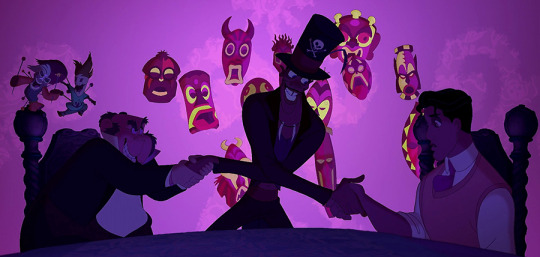
To my recollection, the film sort of gingerly avoids referring to Facilier as a Voodoo practitioner directly (I think he’s more generically called a witch doctor in the script?) but it does seem to imply his 'friends on the other side’ are a consortium of loa. It’s mostly abbreviated into nebulously evil-seeming special FX, glazing over any specificity or dimensionality, but it does also loop back around as a vehicle of moral justice. Loa are all very individualistic and multi-faceted, but they do have reciprocal rules for asking favors of them.
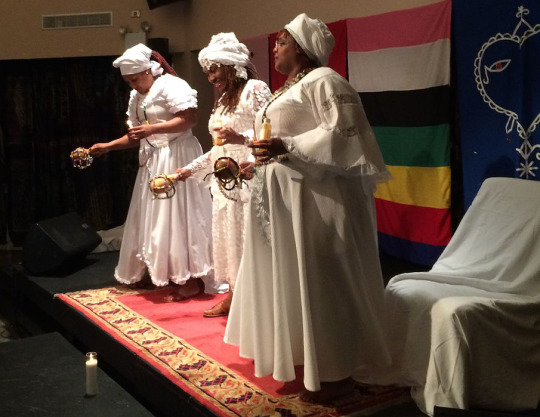
There’s also the benevolent counterpart in Mama Odie’s character. Her wearing ritual whites has a definite basis in Voodoo/Vodou practice, and her depiction as a fairy godmother-like figure isn’t entirely out of step with how a mambo may have been perceived…in a very general sense. They were/are ceremonial leaders and community bastions who people would seek out for help, advice and spiritual guidance. More than just emanating matronly good vibes, though, some have wielded considerable political and economic power.
(Just my opinions here. I’ve done a lot of reading on the subject for research but I’m no authority with any special insider understanding of Voodoo, and I really shouldn’t be relied upon as an arbiter of who has or hasn’t done it justice in fiction.)
————————————————
In summary–
Culturally, I think the film is respectably informed but paints a superficially genteel picture. The set pieces are gorgeous, but the story mostly delivers a sort of veneer of New Orleanishness. And as for fashion, well, it’s the 1920s run through a Disney filter. It’s very pretty, but it’s only as proximally accurate as seemed practical.
I don’t know that any of that really matters so much as whether or not it achieved what it intended, though. As a charming yarn and as a tribute to New Orleans and the Jazz age, I think it’s mostly successful. It’s also really beautifully animated!
5K notes
·
View notes
Text
Rant incoming
I feel like the problem with a lot of Disney's live action remakes (and arguably Wish) is they're trying to appeal to a crowd that no longer exists, namely the people who used to claim that the Disney Princesses were sexist.
All the interviews tend to include, "Well she's not chasing a MAN anymore" which...almost no one sees the princesses like that, anymore. Virtually NO ONE still believes the princesses are man-chasing sexist caricatures of women.
Cinderella is now hailed as an abuse victim who stayed strong long enough to get help to get out of her situation. Anyone who says she should have saved herself is basically regarded as a victim blamer. And it's very clear in the film she wasn't looking to marry the prince, she just wanted a night off. She was the only one who wasn't in line to meet him. She didn't find out she met the prince until he went looking for her!
Snow White is now hailed for her negotiation skills, ability to calm down after extreme stress (she had a moment of panic and had to cry for a bit, but who wouldn't after finding out The Queen hired someone to kill you?), and ability to take charge of a house of adult men. And again, she was an abuse victim, this time trying to escape ASSASSINATION ATTEMPTS. While she dreamed of her prince, it was secondary to her main goal of SURVIVAL. There are also entire video essays about how Snow White gave hope to people during The Great Depression.
Everyone acknowledges that Ariel wanted to be human BEFORE meeting Eric. We all know she was a nerd hyperfixating on humans, and also standing up to her prejudiced father.
We understand Sleeping Beauty wasn't the main character, the Three Good Fairies were, AND PHILLIP WOULD NEVER HAVE BEATEN MALEFICENT WITHOUT THEM! He literally depended on them! WOMEN SAVED THE DAY! But even then, is it really such a sin for a girl to fantasize about romance and fall for someone with corny pickup lines?
We all understand Jasmine just wanted someone to treat her LIKE A PERSON. She rejected every Prince before Aladdin because they treated her like a prize. So why did they need her to want to be Sultan? How did that make her more feminist when she already wanted to be treated like an equal and have a say in her future? Is it only empowering if you want a career in politics?
We admire that Belle, despite living in a judgemental village, was kind to everyone (even though she found the village life dull), and her story teaches girls that the guy everyone else loves isn't always a good guy. What's sexist about teaching girls about red flags? And she didn't start being nice to The Beast until he started treating her with respect and kindness.
Do I really NEED to defend Mulan or Tiana? I think they speak for themselves.
Rapunzel was yet another abuse victim who just needed a little help to get out of her bad situation. In this case, she also needed to learn that she was an abuse victim, and that what Mother Gothel did WASN'T normal, much like many victims of gaslighting.
And don't get me started on the non-princess animals.
Perdita had a healthy relationship with Pongo to the point she was open to express her pregnancy fears to him, and was ready to TEAR APART Cruella's goons for daring to touch her puppies as well as adopting the other puppies. Like, she was so ferocious the goons mistook her for a hyena! She's basically that "I AM THAT GIRL'S MOTHER!" scene from SpyXFamily if Yor were a dog. She and her husband were a TEAM.....but they made a Cruella live action to turn her into a girlboss?! The literal animal abuser!? THAT'S the woman you wanted to put on a pedestal when Perdita was RIGHT THERE!?
Duchess kept her kittens calm after they had been catnapped and was classy as heck. Nice to everyone regardless of social class during a time period where that was uncommon.
Lady stood up to Tramp when she believed he had abandoned her and didn't really care about her. She found out he was a heartbreaker and was like, "Nuh uh. No. You are not doing that to me! You put me through enough."
Miss Bianca from The Rescuers was IN CHARGE the whole movie, and was willing to risk life and limb to save an innocent child. THAT TINY MOUSE TOOK ON ALLIGATORS! And she picked Bernard to accompany her because he was the only one who wasn't ogling her. And then in the sequel SHE DID IT ALL AGAIN! I wish I were as brave as her.
Like, the public haven't accused these ladies of being sexist caricatures since 2014 (Actresses and actors don't count, they're out of touch like the rest of Hollywood) yet Disney is operating under the assumption that the public still thinks that way, hence all the "sHe'S nOt AfTeR a MaN iN ThIs VeRsIOn" talk.
The live action remakes are trying to attract an audience that doesn't really exist much, anymore, and back when it did exist, was comprised mainly of people who didn't actually watch the films. The Disney princesses are no longer seen as sexist, and feminine qualities are no longer seen as weak or undesirable.
1K notes
·
View notes
Text

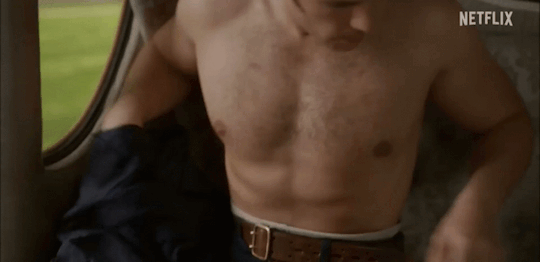
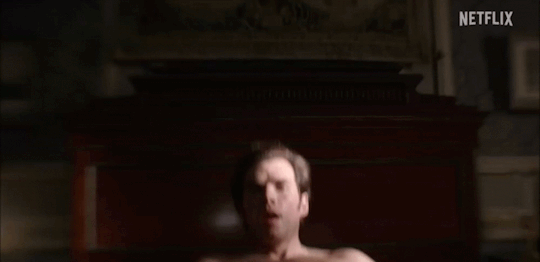
*dead
455 notes
·
View notes
Text
My class was the last one at my school to learn cursive, I grew up reading analog clocks, I had to take a typing crash course in middle school, and I learned the basics of sewing from some ladies at church as a kid.
16K notes
·
View notes
Text
My mother grew up in a broken home, got pregnant at seventeen, has been divorced, and lived as a single mother for years. She’s now been a devout Christian for over twenty years, raised all ten of her children (including me) in the Church, is happily married to the love of her life, and spends her time ministering to others and spoiling her eleven grandchildren.
Anyone who met my mother would call her one of the finest examples of a Christian woman you could ever ask for. The state of her life before she converted does not make her any less of a disciple of Christ than anyone born into the Church, nor does it make anyone else any lesser for their past.
Who you were before is worth a whole lot less than who you choose to be now. God loves all of us, and he wants ALL OF US to come unto Him.
bruh some o these cultural christians are not even trying to blend in. this is how Christianity works, for the uninitiated:
if an ex-OnlyFans girl repents and believes, that's your sister now.
if a goth tattoo artist repents and believes, that's your sister now.
I'm not saying you shouldn't be discerning as to whether the repentance is genuine, but it shouldn't matter what they used to do. only the way they live out their testimony now.
you think you were "respectable" before Christ changed you? think again. if you don't want to be associated with former prostitutes, drug addicts, homosexuals, etc., find a religion that can't save you instead.
575 notes
·
View notes
Text
“Christian kindness is not a substitute for integrity.”
— Jack N. Gerard
#ldsconf#lds general conference#lds church#the church of jesus christ of latter day saints#christianity
10 notes
·
View notes
Text
“No program can replace the influence of loving, covenant-keeping adults.”
— Michael T. Nelson
#ldsconf#lds general conference#lds church#christianity#the church of jesus christ of latter day saints#good parenting#parenthood#parenting
7 notes
·
View notes
Text
“Things work together for good when we minister as Jesus Christ would.”
— Gerrit W. Gong
#lds general conference#ldsconf#christianity#the church of jesus christ of latter day saints#lds church
5 notes
·
View notes
Text
“Ultimately, to do the most good, we must be good.”
— Gerrit W. Gong
#lds general conference#ldsconf#christianity#the church of jesus christ of latter day saints#lds church
7 notes
·
View notes
Text
“Saying we have integrity is insufficient if our actions are inconsistent with our words.”
— Jack N. Gerard
#ldsconf#lds general conference#lds church#christianity#the church of jesus christ of latter day saints
9 notes
·
View notes
Text
togrutas and twi’leks are like star wars tieflings to me
4 notes
·
View notes

